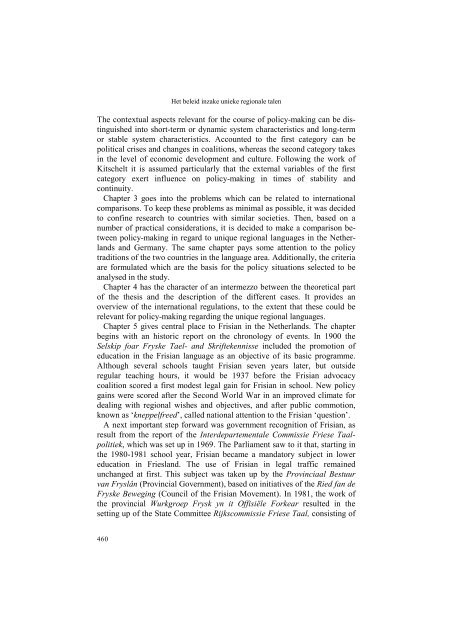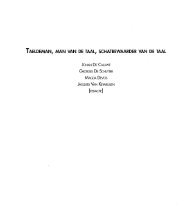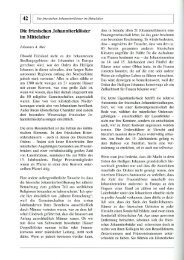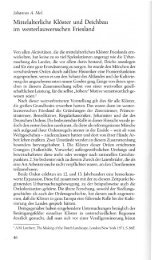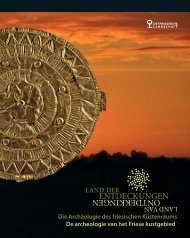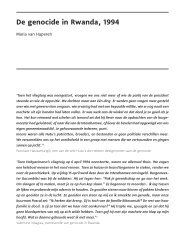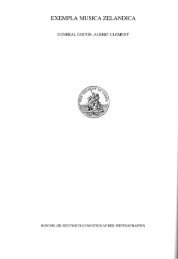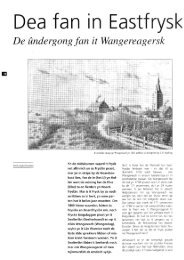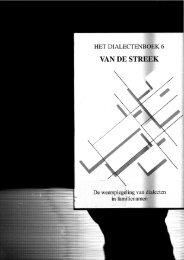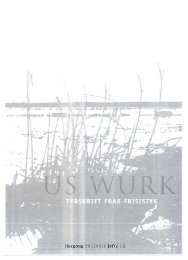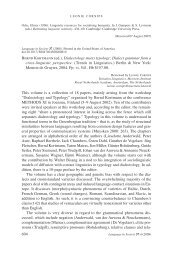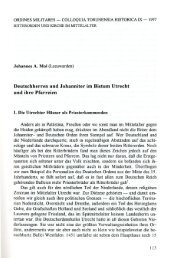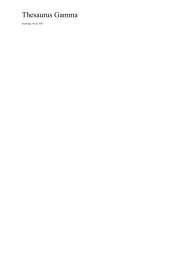- Page 1 and 2:
Het beleid inzake unieke regionale
- Page 3 and 4:
Het beleid inzake unieke regionale
- Page 5 and 6:
Het beleid inzake unieke regionale
- Page 7 and 8:
Inhoud Wurd foarôf ...............
- Page 9 and 10:
Inhoud 6.2.3.1De beleidsvorming ...
- Page 11:
Inhoud 8.4.4Conclusies ............
- Page 14 and 15:
14 Het beleid inzake unieke regiona
- Page 17 and 18:
1.1 Inleiding 1 Inleiding en proble
- Page 19 and 20:
4 Inleiding en probleemstelling wor
- Page 21 and 22:
Inleiding en probleemstelling in ve
- Page 23 and 24:
9 Inleiding en probleemstelling sta
- Page 25 and 26:
13 14 15 Inleiding en probleemstell
- Page 27 and 28:
19 20 21 Inleiding en probleemstell
- Page 29 and 30:
24 25 Inleiding en probleemstelling
- Page 31 and 32:
28 29 30 Inleiding en probleemstell
- Page 33 and 34:
33 Inleiding en probleemstelling He
- Page 35 and 36:
35 36 37 38 39 Inleiding en problee
- Page 37 and 38:
41 42 43 Inleiding en probleemstell
- Page 39 and 40:
Inleiding en probleemstelling inhou
- Page 41 and 42:
49 50 51 Inleiding en probleemstell
- Page 43 and 44:
54 55 56 Inleiding en probleemstell
- Page 45 and 46:
Inleiding en probleemstelling litie
- Page 47 and 48:
62 63 Inleiding en probleemstelling
- Page 49 and 50:
65 Inleiding en probleemstelling He
- Page 51 and 52:
Inleiding en probleemstelling menha
- Page 53 and 54:
Inleiding en probleemstelling van d
- Page 55 and 56:
2.1 Inleiding 2 Het BIC-onderzoeksm
- Page 57 and 58:
5 6 Inleiding en probleemstelling l
- Page 59 and 60:
9 10 Het BIC-onderzoeksmodel combin
- Page 61 and 62:
12 Het BIC-onderzoeksmodel beleidsp
- Page 63 and 64:
13 14 15 Het BIC-onderzoeksmodel ge
- Page 65 and 66:
Het BIC-onderzoeksmodel meer voor d
- Page 67 and 68:
Het BIC-onderzoeksmodel schaarste a
- Page 69 and 70:
Het BIC-onderzoeksmodel grondslag l
- Page 71 and 72:
20 Het BIC-onderzoeksmodel belangri
- Page 73 and 74:
Het BIC-onderzoeksmodel de voortgan
- Page 75 and 76:
23 Het BIC-onderzoeksmodel een bijz
- Page 77 and 78:
26 27 28 Het BIC-onderzoeksmodel be
- Page 79 and 80:
30 31 Het BIC-onderzoeksmodel bestu
- Page 81 and 82:
35 36 Het BIC-onderzoeksmodel verst
- Page 83 and 84:
38 39 Het BIC-onderzoeksmodel Ad. 1
- Page 85 and 86:
42 Het BIC-onderzoeksmodel 42 overi
- Page 87 and 88:
48 Het BIC-onderzoeksmodel evenals
- Page 89 and 90:
50 51 52 Het BIC-onderzoeksmodel Me
- Page 91 and 92:
55 56 57 Het BIC-onderzoeksmodel do
- Page 93 and 94:
Het BIC-onderzoeksmodel In de eerst
- Page 95 and 96:
Het BIC-onderzoeksmodel taalplannin
- Page 97 and 98:
3.1 Inleiding 3 Het vergelijken van
- Page 99 and 100:
4 Het vergelijken van beleid: Neder
- Page 101 and 102:
5 Het vergelijken van beleid: Neder
- Page 103 and 104:
7 Het vergelijken van beleid: Neder
- Page 105 and 106:
8 Het vergelijken van beleid: Neder
- Page 107 and 108:
11 12 Het vergelijken van beleid: N
- Page 109 and 110:
14 15 Het vergelijken van beleid: N
- Page 111 and 112:
19 Het vergelijken van beleid: Nede
- Page 113 and 114:
23 Het vergelijken van beleid: Nede
- Page 115 and 116:
Het vergelijken van beleid: Nederla
- Page 117 and 118:
Het vergelijken van beleid: Nederla
- Page 119 and 120:
28 29 Het vergelijken van beleid: N
- Page 121 and 122:
34 35 Het vergelijken van beleid: N
- Page 123 and 124:
37 38 39 40 41 Het vergelijken van
- Page 125 and 126:
43 44 Het vergelijken van beleid: N
- Page 127 and 128:
48 49 50 51 52 Het vergelijken van
- Page 129 and 130:
55 56 57 58 Het vergelijken van bel
- Page 131 and 132:
59 60 61 Het vergelijken van beleid
- Page 133 and 134:
62 63 Het vergelijken van beleid: N
- Page 135 and 136:
67 68 69 Het vergelijken van beleid
- Page 137 and 138:
72 Het vergelijken van beleid: Nede
- Page 139 and 140:
4.1 Inleiding 1 4 Internationale re
- Page 141 and 142:
5 Internationale regelgeving De Ver
- Page 143 and 144:
8 9 10 Internationale regelgeving n
- Page 145 and 146:
15 16 Internationale regelgeving ee
- Page 147 and 148:
21 22 23 24 Internationale regelgev
- Page 149 and 150:
25 26 Internationale regelgeving 25
- Page 151 and 152:
33 34 35 Internationale regelgeving
- Page 153 and 154:
39 Internationale regelgeving ruime
- Page 155 and 156:
41 42 Internationale regelgeving he
- Page 157 and 158:
Internationale regelgeving Het op 2
- Page 159 and 160:
44 45 46 47 Internationale regelgev
- Page 161 and 162:
51 52 53 Internationale regelgeving
- Page 163 and 164:
56 57 58 Internationale regelgeving
- Page 165 and 166:
61 Internationale regelgeving “he
- Page 167 and 168:
65 66 67 Internationale regelgeving
- Page 169 and 170:
70 Internationale regelgeving conve
- Page 171 and 172:
5.1 Inleiding 1 5 Het Fries in Nede
- Page 173 and 174:
5 6 Het Fries in Nederland school w
- Page 175 and 176:
10 11 12 Het Fries in Nederland pos
- Page 177 and 178:
15 16 Het Fries in Nederland De in
- Page 179 and 180:
17 18 19 Het Fries in Nederland zaa
- Page 181 and 182:
23 24 25 Het Fries in Nederland uit
- Page 183 and 184:
29 30 31 32 Het Fries in Nederland
- Page 185 and 186:
36 37 38 39 40 Het Fries in Nederla
- Page 187 and 188:
43 44 Het Fries in Nederland freque
- Page 189 and 190:
48 49 Het Fries in Nederland daar w
- Page 191 and 192:
50 51 52 53 Het Fries in Nederland
- Page 193 and 194:
56 57 58 59 60 Het Fries in Nederla
- Page 195 and 196:
66 Het Fries in Nederland onderwijs
- Page 197 and 198:
67 68 Het Fries in Nederland ‘Kne
- Page 199 and 200:
Het Fries in Nederland regelgeving
- Page 201 and 202:
75 76 77 78 79 Het Fries in Nederla
- Page 203 and 204:
86 87 Het Fries in Nederland toeged
- Page 205 and 206:
90 91 92 Het Fries in Nederland Beg
- Page 207 and 208:
97 98 99 100 101 Het Fries in Neder
- Page 209 and 210:
104 105 Het Fries in Nederland mini
- Page 211 and 212:
110 111 112 Het Fries in Nederland
- Page 213 and 214:
117 118 Het Fries in Nederland twee
- Page 215 and 216:
124 125 126 Het Fries in Nederland
- Page 217 and 218:
131 132 133 Het Fries in Nederland
- Page 219 and 220:
137 138 139 140 Het Fries in Nederl
- Page 221 and 222:
145 146 147 148 Het Fries in Nederl
- Page 223 and 224:
152 153 Het Fries in Nederland de v
- Page 225 and 226:
155 156 157 158 Het Fries in Nederl
- Page 227 and 228:
166 167 Het Fries in Nederland regi
- Page 229 and 230:
172 173 174 Het Fries in Nederland
- Page 231 and 232:
177 178 179 180 Het Fries in Nederl
- Page 233 and 234:
186 187 188 Het Fries in Nederland
- Page 235 and 236:
195 196 197 198 199 Het Fries in Ne
- Page 237 and 238:
Het Fries in Nederland Een conclusi
- Page 239 and 240:
Het Fries in Nederland pleitcoaliti
- Page 241 and 242:
Het Fries in Nederland Aan het eind
- Page 243 and 244:
6.1 Inleiding 1 6 Het Noordfries in
- Page 245 and 246:
4 5 6 7 Het Noordfries in Duitsland
- Page 247 and 248:
12 Het Noordfries in Duitsland rele
- Page 249 and 250:
14 15 16 Het Noordfries in Duitslan
- Page 251 and 252:
18 19 20 21 Het Noordfries in Duits
- Page 253 and 254:
27 28 Het Noordfries in Duitsland w
- Page 255 and 256:
32 Het Noordfries in Duitsland frie
- Page 257 and 258:
37 38 Het Noordfries in Duitsland w
- Page 259 and 260:
43 44 45 Het Noordfries in Duitslan
- Page 261 and 262:
47 48 49 Het Noordfries in Duitslan
- Page 263 and 264:
50 51 Het Noordfries in Duitsland 5
- Page 265 and 266:
55 56 57 Het Noordfries in Duitslan
- Page 267 and 268:
62 Het Noordfries in Duitsland die
- Page 269 and 270:
Het Noordfries in Duitsland nieuwe
- Page 271 and 272:
73 Het Noordfries in Duitsland te b
- Page 273 and 274:
76 77 78 Het Noordfries in Duitslan
- Page 275 and 276:
81 82 Het Noordfries in Duitsland b
- Page 277 and 278:
87 88 Het Noordfries in Duitsland o
- Page 279 and 280:
89 Het Noordfries in Duitsland same
- Page 281 and 282:
91 92 Het Noordfries in Duitsland
- Page 283 and 284:
96 97 98 Het Noordfries in Duitslan
- Page 285 and 286:
103 104 105 106 107 108 Het Noordfr
- Page 287 and 288:
111 112 113 Het Noordfries in Duits
- Page 289 and 290:
118 119 120 121 Het Noordfries in D
- Page 291 and 292:
127 128 129 130 Het Noordfries in D
- Page 293 and 294:
Het Noordfries in Duitsland Provinc
- Page 295 and 296:
Het Noordfries in Duitsland de betr
- Page 297 and 298:
Het Noordfries in Duitsland betreft
- Page 299 and 300:
7.1 Inleiding 1 7 Het Sorbisch in D
- Page 301 and 302:
4 5 Het Sorbisch in Duitsland randg
- Page 303 and 304:
11 12 13 Het Sorbisch in Duitsland
- Page 305 and 306:
16 17 Het Sorbisch in Duitsland tot
- Page 307 and 308:
19 20 21 Het Sorbisch in Duitsland
- Page 309 and 310:
24 Het Sorbisch in Duitsland opsomm
- Page 311 and 312:
29 30 31 Het Sorbisch in Duitsland
- Page 313 and 314:
34 35 36 Het Sorbisch in Duitsland
- Page 315 and 316:
40 Het Sorbisch in Duitsland 40 rad
- Page 317 and 318:
46 Het Sorbisch in Duitsland ‘Nat
- Page 319 and 320:
Het Sorbisch in Duitsland woongebie
- Page 321 and 322:
50 51 Het Sorbisch in Duitsland Dom
- Page 323 and 324:
Het Sorbisch in Duitsland infrastru
- Page 325 and 326:
57 58 59 Het Sorbisch in Duitsland
- Page 327 and 328:
61 Het Sorbisch in Duitsland het be
- Page 329 and 330:
65 Het Sorbisch in Duitsland op het
- Page 331 and 332:
68 69 70 71 Het Sorbisch in Duitsla
- Page 333 and 334:
73 74 75 76 Het Sorbisch in Duitsla
- Page 335 and 336:
81 82 Het Sorbisch in Duitsland all
- Page 337 and 338:
86 87 88 Het Sorbisch in Duitsland
- Page 339 and 340:
93 94 95 96 Het Sorbisch in Duitsla
- Page 341 and 342:
97 Het Sorbisch in Duitsland verlop
- Page 343 and 344:
99 100 101 Het Sorbisch in Duitslan
- Page 345 and 346:
104 105 Het Sorbisch in Duitsland d
- Page 347 and 348:
108 109 110 Het Sorbisch in Duitsla
- Page 349 and 350:
Het Sorbisch in Duitsland Voor de H
- Page 351 and 352:
Het Sorbisch in Duitsland stabiele
- Page 353 and 354:
112 113 Het Sorbisch in Duitsland I
- Page 355 and 356:
115 116 117 Het Sorbisch in Duitsla
- Page 357 and 358:
121 122 Het Sorbisch in Duitsland v
- Page 359 and 360:
124 125 126 Het Sorbisch in Duitsla
- Page 361 and 362:
129 130 131 Het Sorbisch in Duitsla
- Page 363 and 364:
135 Het Sorbisch in Duitsland Naast
- Page 365 and 366:
139 140 141 142 Het Sorbisch in Dui
- Page 367 and 368:
145 Het Sorbisch in Duitsland gerea
- Page 369 and 370:
148 149 Het Sorbisch in Duitsland N
- Page 371 and 372:
152 Het Sorbisch in Duitsland ‘So
- Page 373 and 374:
156 157 158 Het Sorbisch in Duitsla
- Page 375 and 376:
Het Sorbisch in Duitsland activitei
- Page 377 and 378:
163 Het Sorbisch in Duitsland maken
- Page 379 and 380:
Het Sorbisch in Duitsland Domowina
- Page 381 and 382:
Het Sorbisch in Duitsland gevoerd,
- Page 383 and 384:
Het Sorbisch in Duitsland autonomie
- Page 385 and 386:
Het Sorbisch in Duitsland binnen he
- Page 387 and 388:
Verklaren en vergelijken: terug naa
- Page 389 and 390:
Verklaren en vergelijken: terug naa
- Page 391 and 392:
7 Verklaren en vergelijken: terug n
- Page 393 and 394:
Verklaren en vergelijken: terug naa
- Page 395 and 396:
10 Verklaren en vergelijken: terug
- Page 397 and 398:
Verklaren en vergelijken: terug naa
- Page 399 and 400:
Verklaren en vergelijken: terug naa
- Page 401 and 402:
Verklaren en vergelijken: terug naa
- Page 403 and 404:
12 13 Verklaren en vergelijken: ter
- Page 405 and 406:
Verklaren en vergelijken: terug naa
- Page 407 and 408:
15 Verklaren en vergelijken: terug
- Page 409 and 410: Verklaren en vergelijken: terug naa
- Page 411 and 412: Verklaren en vergelijken: terug naa
- Page 413 and 414: Verklaren en vergelijken: terug naa
- Page 415 and 416: Verklaren en vergelijken: terug naa
- Page 417 and 418: Verklaren en vergelijken: terug naa
- Page 419 and 420: 16 Verklaren en vergelijken: terug
- Page 421 and 422: Verklaren en vergelijken: terug naa
- Page 423 and 424: Verklaren en vergelijken: terug naa
- Page 425 and 426: Verklaren en vergelijken: terug naa
- Page 427 and 428: Verklaren en vergelijken: terug naa
- Page 429 and 430: Verklaren en vergelijken: terug naa
- Page 431 and 432: Verklaren en vergelijken: terug naa
- Page 433 and 434: Verklaren en vergelijken: terug naa
- Page 435 and 436: Verklaren en vergelijken: terug naa
- Page 437 and 438: 19 Verklaren en vergelijken: terug
- Page 439 and 440: Verklaren en vergelijken: terug naa
- Page 441 and 442: Verklaren en vergelijken: terug naa
- Page 443 and 444: 21 Verklaren en vergelijken: terug
- Page 445 and 446: Verklaren en vergelijken: terug naa
- Page 447 and 448: Gearfetting Haadstik 2 fan de stúd
- Page 449 and 450: Gearfetting oangeande de Fryske taa
- Page 451 and 452: Gearfetting wurde. De ynteraksje tu
- Page 453 and 454: Gearfetting ynstrumint as de STEK y
- Page 455 and 456: Gearfetting - it feit dat foar alle
- Page 457 and 458: Gearfetting 457
- Page 459: Gearfetting - What conclusions can
- Page 463 and 464: Summary explained from the circumst
- Page 465 and 466: Summary there is clearly policy-ori
- Page 467 and 468: Summary - in the fact that policy i
- Page 469 and 470: Summary 469
- Page 471 and 472: Summary - Wie hat sich die betreffe
- Page 473 and 474: Zusammenfassung später einige Schu
- Page 475 and 476: Zusammenfassung werden. Daneben dar
- Page 477 and 478: Zusammenfassung Lernvermögen im Si
- Page 479 and 480: Zusammenfassung vermögen. Im Horno
- Page 481 and 482: Zusammenfassung - dem Umfang der Po
- Page 483 and 484: Literatuur overzicht Baakman, N.A.A
- Page 485 and 486: Literatuur overzicht Cammen, H. van
- Page 487 and 488: Literatuur overzicht Elle, Ludwig (
- Page 489 and 490: Literatuur overzicht Goede, Peter d
- Page 491 and 492: Literatuur overzicht Heuvel, J.H.J.
- Page 493 and 494: Literatuur overzicht Jürgensen, Ku
- Page 495 and 496: Literatuur overzicht 2 Lijphart, Ar
- Page 497 and 498: Literatuur overzicht Oschlies, Wolf
- Page 499 and 500: Literatuur overzicht Roosens, Eugee
- Page 501 and 502: Literatuur overzicht Staden, A. van
- Page 503 and 504: Literatuur overzicht Twist, Mark va
- Page 505 and 506: Literatuur overzicht Wower-Schäfer
- Page 507 and 508: Overzicht gebruikte dagbladen, tijd
- Page 509: 509


